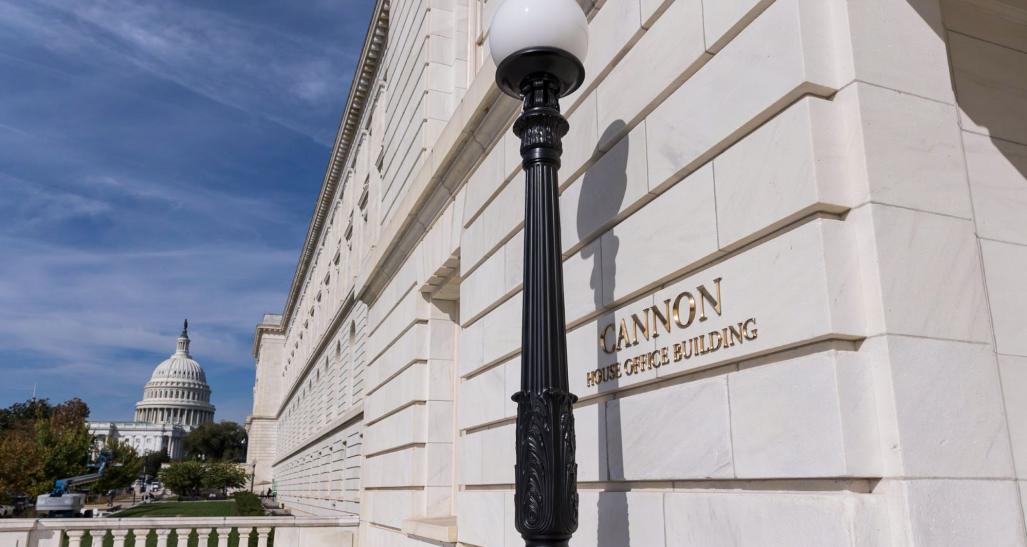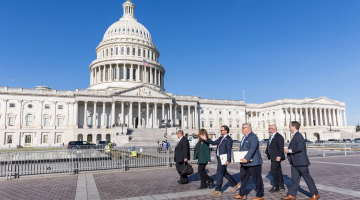
In 2024, the retail community will continue its efforts to advocate for policies that combat organized retail crime, increase competition to reduce credit card swipe fees, protect workforce flexibility and promote retail careers, and prevent further disruptions to the supply chain.
The second session of the 118th Congress features the most narrowly divided House and Senate since 2001, with House Republicans holding a slim majority of 219-213, with three vacancies as of Jan. 29, 2024. The Senate remains in Democrat control with a 51-49 majority.
The battle for control of the two chambers of Congress will play out over the course of the 2024 election cycle — which features 41 House members and seven members of the Senate opting for retirement and not running for reelection. Narrow majorities and electoral politics will play a key role in how we advance our legislative priorities this year.
Addressing organized retail crime
As the leading voice for the retail industry, NRF will continue to push for policy solutions to curb the threat of retail crime in stores large and small across the country. Our first legislative success came last June when the INFORM Act went into effect.
The next step is action on the Combating Organized Retail Crime Act, which now has more than 120 bipartisan co-sponsors in Congress. By establishing an interagency Organized Retail Crime Center, this bill enables retailers to share data across federal, state and local agencies, and makes it easier for law enforcement to investigate and prosecute these sophisticated crimes. Get involved and tell your members of Congress to support CORCA today.
Increasing competition and lowering credit card swipe fees
The United States pays the highest credit card swipe fees in the world, and the growth of these fees has outpaced the growth of sales in recent years. Retailers have spent years trying to bring the networks to the negotiating table and have seen multiple cases get stalled in court — but now they have a solution in Congress.
Learn more about CCCA and how it benefits both retailers and consumers alike.
The Credit Card Competition Act, introduced by Reps. Lance Gooden, R-Texas, and Zoe Lofgren, D-Calif., in the House and Sens. Dick Durbin, D-Ill., Roger Marshall, R-Kan., and Peter Welch, D-Vt., in the Senate, would require only the largest card-issuing financial firms to enable a second network to route transactions on their credit cards. Estimated to save retailers and consumers $15 billion annually in swipe fees, this bill will not end credit card rewards. It will improve card security, and will benefit small businesses and their customers.
By injecting competition into the market, Congress has an opportunity to support small businesses that pay the highest swipe fees in the world, despite their having the slimmest margins to negotiate with highly profitable Wall Street banks.
Preserving pro-growth tax rates
The Tax Cuts and Jobs Act of 2017 ushered in major changes to the tax code, but unfortunately its benefits to the retail industry aren’t here to stay. TCJA was the first major overhaul of federal tax law in three decades, and many of its provisions will sunset at the end of 2025. Retailers benefited from a lowered tax rate of 21% and those savings are being reinvested into operations, retail worker benefits and the prices consumers pay.
The Biden administration proposed increasing the federal corporate tax rate from its current 21% to 28%, which would make it one of the highest in the industrialized world. This increase could force retailers to close their least profitable stores, eliminate jobs and change their investment strategies.
Barring congressional action, 90% of our current tax code will expire in 2025, leaving a gap in tax revenue expected to cost somewhere between $3 trillion to $5 trillion. 2024 will be pivotal, as both parties and presidential candidates will float new tax policies to make up that estimated amount and minimize adverse effects on retailers.
NRF is ready to pursue our top legislative tax priorities: defending the 21% federal corporate tax rate; leading the fight to prevent passage of legislation that would tax imports; and pushing for the extension of critical provisions like the business interest deduction and accelerated depreciations.
Limiting supply chain disruption and promoting free trade
Attacks on commercial vessels in the Red Sea have resulted in hundreds of ships rerouting to avoid these altercations. The detour they follow tacks on an extra 4,000 miles of sailing, inflates costs and adds 10 travel days in each direction to each journey.
A joint statement condemning interference with navigational rights and freedoms in waters was released by the U.S., EU, NATO and a group representing 44 allies and partner nations following the Department of Defense’s establishment of the Operation Prosperity Guardian, a new multinational security initiative to streamline security in the region. While it is still unclear how this initiative will unfold, NRF will continue to monitor the ongoing supply chain disruptions.
NRF continues to call for eliminating the Section 301 tariffs on products imported from China. Our Americans for Free Trade coalition recently sent a letter to the U.S. Trade Representative seeking an immediate renewal of exclusions that were set to expire on Dec. 31, 2023. As a result, the USTR granted a five-month extension of the exclusions and will open up a new comment process. NRF also released a report on the potential impact from the revocation of China’s Permanent Normal Trade Status, which could result in significant tariffs on key categories such as apparel, footwear, toys, home appliances and furniture.
Developing a modern and flexible workforce
In October, the National Labor Relations Board released its final rule to expand the definition of what is considered a “joint employer” under federal law. In a significant change of federal law, the new rule could find two separate companies to be joint employers by merely retaining “indirect” or unexercised potential control over the other’s employees.
Visit the NRF Action Center and reach out to Congress on issues affecting the retail industry.
In changing this rule, the NLRB is poised to disrupt current and potential business relationships between retailers and their contractors. A joint resolution to nullify the final rule has passed in the House and awaits action in the Senate; however, the likelihood of a presidential veto is high. NRF has already filed suit and will further challenge the NLRB’s rule change in courts and on Capitol Hill.
Retailers have a particular interest in ensuring the efficiency and functionality of our nation’s legal immigration system. At a time when millions of people who contribute to every aspect of our economy and society struggle to find jobs due to legal uncertainties, the time to address flaws within our immigration system is now. NRF supports increasing the number of visas available for guest workers, accelerating work authorizations for legal asylum seekers, protecting employers from burdensome enforcement requirements, and providing permanent legal certainty to Dreamers.
Stay involved
NRF is the leading voice for every retailer and every retail job. No one is closer to the American consumer than retailers, and no one is closer to retailers than NRF. Visit NRF’s Action Center to help advocate for retail’s top priority issues throughout 2024.

